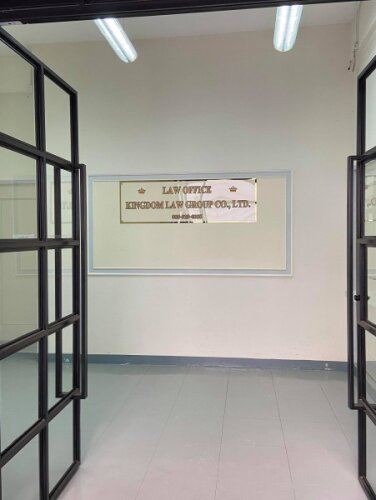Best Government Contract Lawyers in Watthana
Share your needs with us, get contacted by law firms.
Free. Takes 2 min.
List of the best lawyers in Watthana, Thailand
Thailand Government Contract Legal Articles
Browse our 1 legal article about Government Contract in Thailand written by expert lawyers.
- Managing Risks in Public-Private Partnership Projects
- Public Procurement and Public-Private Partnerships (PPPs)Public procurement involves the acquisition of goods, services, and infrastructure by governmental entities from private sector entities. This interaction has historically enabled private companies to contribute to the development and management of public infrastructure, including roads, hospitals, schools, and other civic structures. Under conventional procurement... Read more →
About Government Contract Law in Watthana, Thailand
Government contract law in Watthana, Thailand, refers to the set of legal principles and regulations that oversee the creation and execution of agreements between private entities and government bodies at the district or national level. These contracts can range from procurement of goods and services to infrastructure projects and joint ventures. The process is governed by rules that ensure transparency, efficiency, and equity, while addressing the needs of both public administration and private contractors. Watthana, known as a prominent business and residential district in Bangkok, often sees considerable governmental contractual activity driven by its urban development and public service initiatives.
Why You May Need a Lawyer
Consulting with a lawyer experienced in government contract law is beneficial in several situations. Common scenarios include preparing bids for government projects, negotiating contract terms, addressing disputes about contract performance or payment, and ensuring compliance with relevant regulations. Legal assistance is also critical if you face allegations of non-compliance, wish to appeal a disqualified tender submission, or require advice on changes to contract terms. Since government contracts often include detailed and complex requirements, professional guidance can help you avoid costly mistakes and safeguard your rights and interests.
Local Laws Overview
Government contracts in Watthana are subject to national legislation and local regulations. The principal law governing public procurement is the Public Procurement and Supplies Administration Act, B.E. 2560 (2017), which lays out transparent tendering procedures and dispute resolution mechanisms. There are also ministerial regulations and guidelines from the Comptroller General’s Department that must be followed. Additional considerations include anti-corruption measures, project-specific environmental laws, and labor regulations. The legal landscape emphasizes fair competition, audit compliance, and open access to procurement opportunities.
Frequently Asked Questions
What is a government contract in Thailand?
A government contract is an agreement between a private party or company and a state agency for the provision of goods, services, or construction projects, regulated by specific statutes and policies.
How does the bidding process for government contracts work?
Government agencies typically announce procurement opportunities through public notices. Interested businesses must prepare and submit bids in accordance with the specified guidelines, which are then evaluated before a winner is selected based on price, quality, and compliance.
How can I ensure my bid for a government contract is compliant?
Review the official tender documents closely, ensure all requested forms and information are provided, and follow procedural instructions exactly. Consulting a legal professional familiar with procurement laws is highly recommended.
What happens if there is a dispute over a government contract?
Disputes may be resolved through administrative review, mediation, or litigation in administrative courts, depending on the nature of the issue. Many contracts specify dispute resolution processes up front.
Are government contracts in Watthana open to foreign companies?
Some tenders are open to foreign entities, especially for specialized or large-scale projects. However, there may be restrictions or additional requirements for foreign bidders, including partnership obligations with local firms.
What documents are typically required when bidding for a government contract?
Common requirements include a business registration certificate, tax documents, references for past projects, financial statements, and technical proposals tailored to the project specifications.
What are common reasons contracts are terminated?
Contracts may be terminated due to breach of terms, non-performance, insolvency, mutual agreement, or changes in governmental policy or funding.
How are payments handled in government contracts?
Payments are usually based on milestones specified in the contract. It is common to require submission of progress reports, invoices, and inspection certificates before payment is made, subject to government approval.
What legal risks should I be aware of when entering a government contract?
Risks include strict compliance obligations, penalties for non-performance, possible sanctions for corruption, and administrative challenges such as delays and audits.
Can contract terms be negotiated with the government?
Basic contract terms are often fixed, but some elements may be negotiable, especially if the procurement method allows for competitive negotiation or direct purchase processes. Engaging a lawyer helps ensure favorable and compliant terms.
Additional Resources
For further information or support, consider reaching out to the following resources:
- Comptroller General’s Department: Main authority administering public procurement procedures.
- State Enterprise Policy Office: Oversees public-private partnership projects in Thailand.
- Office of the National Anti-Corruption Commission: Provides guidelines on anti-corruption measures in public contracts.
- Bangkok Metropolitan Administration Procurement Division: Handles tenders specific to the Bangkok area, including Watthana.
- Local law firms and independent legal advisors with expertise in public procurement.
Next Steps
If you are seeking legal assistance regarding a government contract in Watthana, start by gathering all relevant documents, including any past correspondence, contracts, and bids. Prepare a detailed summary of your situation and objectives. Research and consult with a local lawyer who has experience with government contracts and public procurement law. Discuss your case thoroughly, ask for advice on your rights and obligations, and develop a strategy that ensures compliance and protects your interests throughout the contracting process.
Lawzana helps you find the best lawyers and law firms in Watthana through a curated and pre-screened list of qualified legal professionals. Our platform offers rankings and detailed profiles of attorneys and law firms, allowing you to compare based on practice areas, including Government Contract, experience, and client feedback.
Each profile includes a description of the firm's areas of practice, client reviews, team members and partners, year of establishment, spoken languages, office locations, contact information, social media presence, and any published articles or resources. Most firms on our platform speak English and are experienced in both local and international legal matters.
Get a quote from top-rated law firms in Watthana, Thailand — quickly, securely, and without unnecessary hassle.
Disclaimer:
The information provided on this page is for general informational purposes only and does not constitute legal advice. While we strive to ensure the accuracy and relevance of the content, legal information may change over time, and interpretations of the law can vary. You should always consult with a qualified legal professional for advice specific to your situation.
We disclaim all liability for actions taken or not taken based on the content of this page. If you believe any information is incorrect or outdated, please contact us, and we will review and update it where appropriate.















